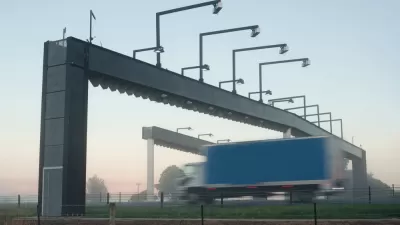Delays in constructing an extensive truck-only toll system have caused a shortfall in toll revenue affecting the Rhode Island DOT budget. A promise to repair bridges repair means a big cut for bike and pedestrian funding.

"The Rhode Island Department of Transportation [RIDOT] has proposed cutting $28 million from bicycle and pedestrian projects and trimming $96 million from its highway repaving budget over the next decade in the most recent changes to its 10-year transportation spending plan," reports Patrick Anderson for the Providence Journal.
The changes, which have drawn the ire of advocates for improved bicycle and pedestrian infrastructure, will allow the state to keep the promise it made when lawmakers approved truck tolls in 2015 [sic], to have 90 percent of the state’s highway bridges structurally sufficient by 2025. Currently, 77 percent of Rhode Island’s bridges are rated structurally sufficient.
At the time, the Ocean State had the dubious distinction of having the highest percentage of state bridges, 56 percent, being rated deficient, which includes both structurally deficient and functionally obsolete categories. Finding revenue to repair bridges was one of the main reasons that led the state legislature in February 2016 to approve Gov. Gina Raimondo's truck-only toll program, known as RhodeWorks.
The unique tolling program, which only applies to specific types of tractor trailers and relies on electronic toll collection as opposed to toll booths, became operational in June 2018, "roughly a year later than first anticipated — due to a more time-consuming federal approval process and toll-equipment testing," reports Anderson, and that means a shortfall of projected toll revenue.
Furthermore, only two of the 13 planned toll gantries have been constructed and are operational, but the department received good news from the federal government in December.
"RIDOT announced Dec. 20 that the Federal Highway Administration has granted approval for the state to proceed with construction on another series of tolling gantries," reported Eleanor Lamb for Transport Topics.
According to RIDOT, the next tolling gantry is expected to be completed and operational by May. The remaining tolling locations will be activated “in quick succession” every one or two months. The 10 gantries are expected to be completed by May 2020.
Diversion of federal active transportation funding
According to Angie Schmitt of Streetsblog USA, RIDOT chose to "transfer $27 million in federal money dedicated to active transportation to highways and administrative expenses over the next 10 years."
The transfer will rob funding from City Walk, the innovative on-road trail project underway in Providence aimed at increasing walking and biking rates and improving safety.
The Rhode Island Bicycle Coalition has issued a "call to action" to its members to restore funds to the Transportation Alternatives Program.
"We object, in the strongest possible terms, to the amendment proposed by the Rhode Island Department of Transportation," states their Jan. 26 press release.
Funds in the Transportation Alternatives Program should not be raided for highway infrastructure projects or other priorities. Rhode Island’s citizens deserve better.
FULL STORY: R.I. truck-toll delays are cutting into funds for DOT projects

Alabama: Trump Terminates Settlements for Black Communities Harmed By Raw Sewage
Trump deemed the landmark civil rights agreement “illegal DEI and environmental justice policy.”

Planetizen Federal Action Tracker
A weekly monitor of how Trump’s orders and actions are impacting planners and planning in America.

How Atlanta Built 7,000 Housing Units in 3 Years
The city’s comprehensive, neighborhood-focused housing strategy focuses on identifying properties and land that can be repurposed for housing and encouraging development in underserved neighborhoods.

In Both Crashes and Crime, Public Transportation is Far Safer than Driving
Contrary to popular assumptions, public transportation has far lower crash and crime rates than automobile travel. For safer communities, improve and encourage transit travel.

Report: Zoning Reforms Should Complement Nashville’s Ambitious Transit Plan
Without reform, restrictive zoning codes will limit the impact of the city’s planned transit expansion and could exclude some of the residents who depend on transit the most.

Judge Orders Release of Frozen IRA, IIJA Funding
The decision is a victory for environmental groups who charged that freezing funds for critical infrastructure and disaster response programs caused “real and irreparable harm” to communities.
Urban Design for Planners 1: Software Tools
This six-course series explores essential urban design concepts using open source software and equips planners with the tools they need to participate fully in the urban design process.
Planning for Universal Design
Learn the tools for implementing Universal Design in planning regulations.
Caltrans
Smith Gee Studio
Institute for Housing and Urban Development Studies (IHS)
City of Grandview
Harvard GSD Executive Education
Toledo-Lucas County Plan Commissions
Salt Lake City
NYU Wagner Graduate School of Public Service



























